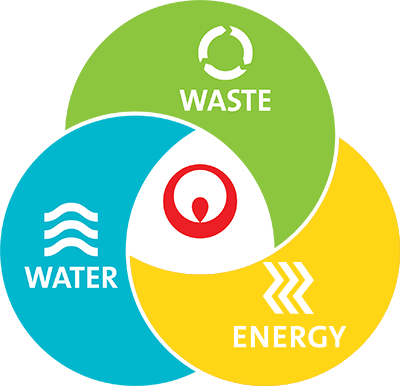Veolia supports the growing demand for renewable energy and, wherever possible, develops solutions to supply green energy to its customers.
How can we help?
Businesses and industries need to juggle between meeting increasing energy demands and achieving sustainability commitments. Therefore, finding ways to recycle and recover resources sustainably is paramount as the amount of waste generated continues to accelerate.
Veolia offers waste to energy solutions, ensuring optimal technical performance, safety and compliance to local regulations. With more than 90 Waste-to-Energy facilities managed by Veolia around the world, we can provide quality and reliable technological solutions, turning waste into useful energy.
How do we create value to our customers?
Veolia’s unparalleled cross-industry expertise in energy and waste management uniquely positions us to develop solutions that unlock the energy potential of organic and, in some cases, inorganic wastes. Our solutions offer the following benefits:
- Derive maximum value from resources
- Proven solutions that reduce greenhouse gas emissions
- Innovative strategies to offset non-renewable energy
- Electricity and thermal energy applications
- Progressive circular economy approaches
- Local job creation and waste reduction
Our solutions for waste to energy
Veolia creates reliable and environmentally sustainable solutions that convert waste streams to energy with biogas and biomass.
Biogas
Veolia utilises biogas from the anaerobic digestion of organic waste to fuel cogeneration facilities. By converting biosolids, fats, oils and grease into electricity and heat, Veolia can help systems increase resource productivity while reducing greenhouse gas emissions.
Biomass
Veolia is able to design, build, operate and maintain biomass facilities where waste streams, such as wood waste and are used as fuel to generate renewable and cost-effective energy.
Heat recovery
The energy generated by the combustion of non-recyclable waste produces electricity and heat for either local industry or domestic energy needs. Waste-to-energy therefore helps conserve fossil fuels, limit greenhouse gas emissions and reduce the volume of waste sent to landfills.
At all its waste-to-energy facilities, Veolia applies the standards established under European regulations. In particular, they stipulate threshold values for flue-gas emissions.
Refuse-derived fuel (RDF)
Veolia is involved in developing the refuse-derived fuel (RDF) sector. RDF is dry, non-hazardous waste that can be used as a fuel for co-incineration (for example, in cement works furnaces). RDF provides a way to recover a significant fraction of municipal waste or non-hazardous industrial waste while at the same time meeting industry’s growing demand for energy.

Veolia is uniquely positioned to service industry, government and commercial entities in improving performance, managing water, energy and waste


